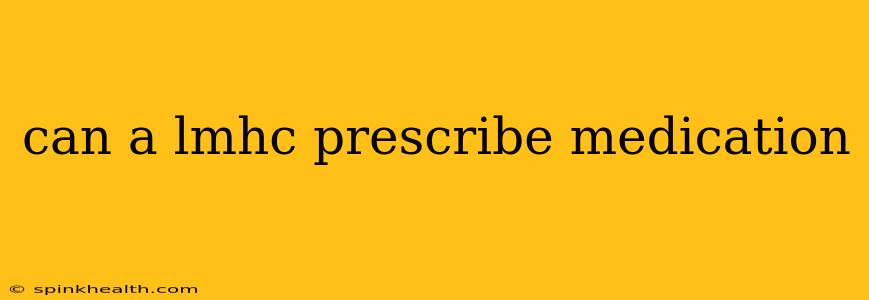Can a LMHC Prescribe Medication? The Short Answer: No.
Let's settle this right away: no, a Licensed Master's level Clinical Health Counselor (LMHC) cannot prescribe medication. This is a crucial distinction, and one that's vital for understanding the roles of different mental health professionals.
My journey into the world of mental health began with a deeply personal experience. Struggling with anxiety, I sought help, and that's where I first encountered the difference between therapists and psychiatrists. It was a confusing time, filled with questions about who could do what, and I realized many others shared my confusion. This article aims to clarify the roles and responsibilities of LMHCs and other mental health professionals, particularly regarding medication prescription.
What Does an LMHC Do?
An LMHC is a trained mental health professional who provides therapy and counseling. They are experts in talk therapy, using various techniques to help clients work through their challenges. This can include cognitive behavioral therapy (CBT), dialectical behavior therapy (DBT), or other evidence-based approaches. They help clients identify patterns, develop coping mechanisms, and improve their overall well-being. Think of them as skilled guides helping you navigate the complexities of your mental health. They listen, they empathize, and they provide tools and strategies to help you improve your life.
What About Psychiatrists and Prescribing Medication?
This is where the critical difference lies. Psychiatrists are medical doctors (MDs or DOs) who specialize in mental health. Their unique qualification is their ability to diagnose mental illnesses and prescribe medication. They are trained to understand the biological and chemical aspects of mental health and how medication can interact with the brain to alleviate symptoms. They often work collaboratively with therapists, coordinating treatment plans to achieve the best possible outcome for the client.
Why the Distinction? Different Training, Different Roles.
The key difference lies in training. While LMHCs receive extensive training in psychotherapy and counseling techniques, psychiatrists undergo medical school and a residency specifically focused on psychiatry. This medical training enables them to understand the complexities of psychopharmacology (the study of medications affecting the brain) and prescribe appropriate medications. Confusing the roles can lead to delays in getting necessary help and potentially dangerous situations.
So, Who Should I See?
The best person to see depends on your specific needs. If you're struggling with mental health challenges and are considering medication as a possible treatment option, you should start by seeing a psychiatrist. They can assess your symptoms, diagnose your condition, and prescribe medication if appropriate. They may also recommend therapy with an LMHC or other therapist as part of a comprehensive treatment plan. Many people benefit from both medication management and therapy for optimal mental health.
Can an LMHC Recommend Medication?
While an LMHC cannot prescribe medication, they can certainly recommend you see a psychiatrist or other medical professional if they feel medication might be beneficial. They are trained to recognize signs and symptoms that might indicate the need for medication and will often make referrals to help you access appropriate care.
What Other Professionals Can Prescribe Medication?
In some states, other professionals like psychiatric nurse practitioners (NPs) and physician assistants (PAs) may also be authorized to prescribe medication under certain conditions and with specific certifications. However, it's always best to check the specifics of your state's regulations.
In conclusion, navigating the world of mental health professionals can be confusing. Understanding the distinct roles of professionals like LMHCs and psychiatrists is vital in accessing the right kind of care. Remember, there's no shame in seeking help, and finding the right professional can make all the difference in your journey to better mental well-being.

